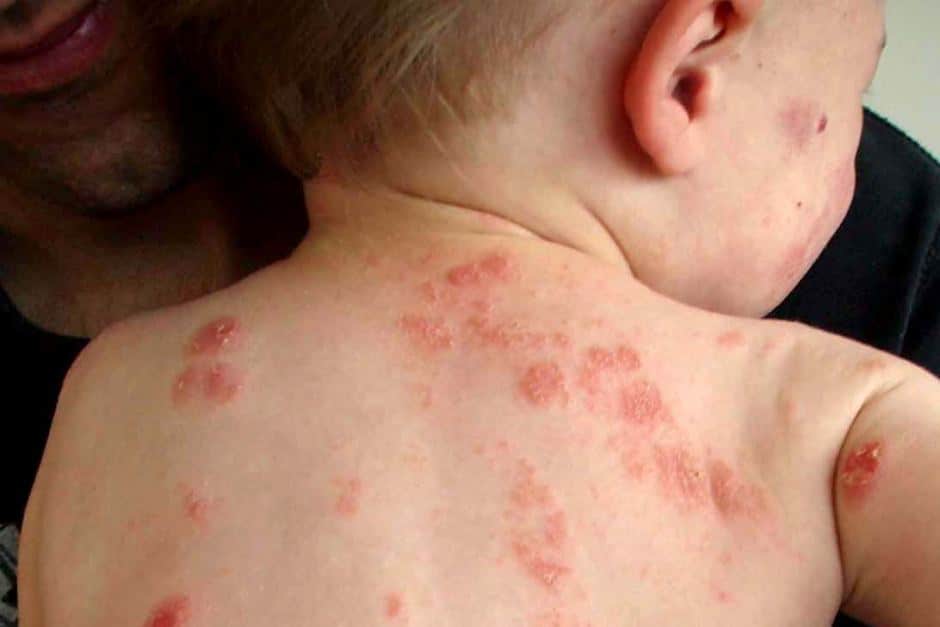
In the 1940s, only 4 percent of infants were reported to have eczema, now the number is closer to 25 percent. Some of that increase may be the common lotions, oils, and even soaps that are used on infants during the early weeks. Professor Richard Cork, head of academic dermatology at the School of Medicine and Biomedical Sciences at Sheffield University, says infants who are already predisposed to eczema suffer an increased risk of the condition because of these typical baby products.
‘These babies are born with a defective skin barrier, which means that their skin can be sensitised — made prone to an allergic reaction — much more easily if the “wrong” treatments are used,’ says Professor Cork.
‘The outer layer of the skin, called the stratum corneum, provides a barrier which normally prevents the penetration of irritants and allergens.
‘But in babies who are predisposed to atopic eczema, this does not work as effectively, allowing loss of water from the corneocytes (cells in the skin), which shrink and allow cracks to open between them, so irritants and allergens can penetrate, leading to lesions from eczema.
‘The use of soap on the skin leads to a further deterioration of the barrier, because it breaks down the cells which are still forming in babies’ skin.’
Many baby products today contain harsh soaps and detergents and synthetic chemicals that may affect infants’ skin more so than products from 60 years ago. Even the prescription medication used to treat eczema may actually make it worse. According to Professor Cork, the common treatments prescribed were actually designed to be alternatives to soap and can be just as damaging to the skin.
Eczema typically appears on infants at around 2 months of age. Having eczema can lead to other health issues for infants and children, such as psoriasis, asthma and food allergies. Margaret Cox, chief executive of the National Eczema Society, says there needs to be more awareness for parents on just how to care for infants’ skin.
Professor Cork advices parents to avoid lotions, soaps, and creams that contain perfumes and dyes. He also, however, warns against organic and natural baby products that do not contain some sort of preservative. Bacteria can set into these products and get into any cracks or open places in the skin. He plans to publish more information later this year on which products he feels are dangerous for infants. – Summer, staff writer
Related Articles:
- Probiotics In Moms Means Less Eczema For Kids
- Johnson’s Brand Introduces Natural Line For Kids and Babies
- Study Raises Concerns About Safety Of Baby Products







Jojoba oil, the pure stuff, with nothing else added, is great. It’s completely natural and most closely resembles the skin’s natural sebum. In place of that, things like cocoa butter or even olive oil is healthy. I don’t know how people can place toxic, man-made lotions on theirs and their baby’s skin. Those contain pthalates which are hormone disrupters as well as fragrance which is a known carcinogen, not to mention they often also contain ropylene glycol, which along with being in many common cosmetics is also used in things like anti-freeze. It’s very bad for you and also for the environment, seeing as it’s a petroleum by-product. Oh, I could rant on about how bad regular creams and lotions are for a while!
Totally agree with petals!! I cured my son’s eczema with homeopathy, aloe vera and calendula cream. Any natural oil (not mineral oil) is very good including jojoba & olive oil. Olive is particularly good with a drop of Lavender & Chamomile essential oil & makes a great bedtime baby massage oil too. If you find olive too oily, try sweet almond which is also good. I have found Shea butter incredibly good for eczema, psoriasis, nappy rash and dry skin. Always do a small patch test if you are using shea butter or nut oils in case of allergy.